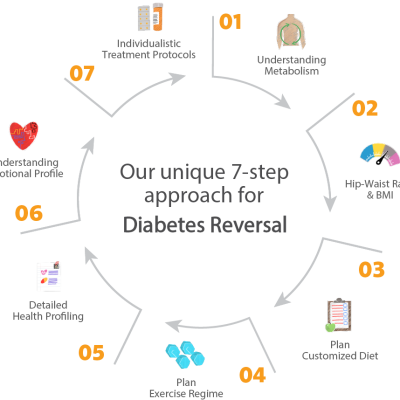Get your diabetes reversed today!
Achieve complete reversal of diabetes with
our personalised 7-step program:
Custom Nutrition Plans
Lifestyle Transformation
Safe & Scientific treatment

Diabetes is a disturbance in the way the body regulates and uses sugar (glucose) as fuel for our day-to-day body functions.
This long-term or chronic condition results in too much sugar circulating in the bloodstream.
Eventually, high blood sugar levels can lead to disorders of the circulatory, nervous and immune systems.
Diabetes Reversal


Common Symptoms Of Diabetes
- Excessive hunger
- Sudden weight gain or loss
- Increasing thirst
- Frequent urination
- Headache & fatigue
- Skin allergies
- Blurry vision
Allied Diseases:
1) Retinopathy: Diabetes can affect the eyes and vision in several ways. High blood sugar levels associated with Diabetes can damage the blood vessels in the retina, the part of the eye responsible for transmitting visual signals to the brain. It is called diabetic retinopathy, the most common cause of blindness in working-age adults. Other vision- related complications of Diabetes include cataracts and glaucoma.
2) Heart Disease: Diabetes is a significant risk factor for heart disease. People with Diabetes have a higher risk of developing heart disease and stroke than those without Diabetes. High blood sugar levels can damage the blood vessels, including those that supply the heart and brain, leading to a higher risk of heart attack and stroke. Additionally, people with Diabetes are more likely to have other risk factors for heart disease, such as high blood pressure and high cholesterol.
3) Kidney Disease: Diabetes is a leading cause of kidney disease, also known as diabetic nephropathy. High blood sugar levels over a prolonged period can damage the blood vessels in the kidneys, making it difficult to filter waste and excess fluid from the blood. It can lead to a build-up of toxins in the body and eventually result in kidney failure. People with Diabetes are at a higher risk of developing kidney disease and need regular check-ups to monitor their kidney function.
How do Homeopathy cure Diabetes and its allied diseases?
Since Diabetes mellitus is a chronic condition, there are two aspects that the doctor must be considered in its treatment with homoeopathy.
First, the underlying physical condition of the individual must be taken into account. After a thorough analysis of the patient’s physical condition, homoeopathy treatment improves the body’s defence mechanism and makes room for healing. Homeopathy also works by regulating sugar metabolism and improving the body’s capacity to absorb and assimilate nutrients. Moreover, homoeopathy also prevents any complications or side effects from occurring as it stimulates the body’s self-defence mechanism.
Second, the doctor must take account of the patient’s emotional condition, so that he or she can analyse the body’s physical responses to a person’s emotional reactions. This allows the doctor to target both the body and the mind in the treatment process and enables holistic restoration of the body and the mind. Moreover, the doctor can help with the individual’s lifestyle and dietary habits, thereby allowing for the medication to take its effect properly.
Controlling blood sugar levels, maintaining a healthy diet, getting regular exercise, and not smoking can help to reduce the risk of heart disease, eye problems and kidney diseases.
Homoeopathy treatment can effectively reduce the complications caused by these allied diseases by improving the overall health of the body. It consistently targets the enhancement of the body’s ability to defend itself against any disease, and thereby allows for holistic healing of the patient’s body.
What happens when you have diabetes?
High blood sugar levels can lead to disorders of the circulatory, nervous and immune systems.
In type 2 diabetes, there are primarily two interrelated problems at work. Your pancreas does not produce enough insulin — a hormone that regulates the movement of sugar into your cells — and cells respond poorly to insulin and take in less sugar.
Can pre-diabetes be reversed?
Progression from pre-diabetes to type 2 diabetes is reversible. Pre-diabetes means you have a just more than normal values blood sugar level. But It’s not high enough to be considered type 2 diabetes yet. Eating healthy foods, making physical activity part of your daily routine and staying at a healthy weight can help bring your blood sugar level back to normal.
Can type 2 diabetes be reversed?
Yes, reversal is possible for type 2 diabetes. Certain factors decide your probability of reversing diabetes. Some of these factors include your age. For people who meet the necessary criteria, diabetes reversal is possible when it is done under the correct guidance in a proper scientific method.
And for those who do not meet the criteria, following some guidelines can help you achieve partial remission – where your blood sugars are better than what they were before.
What are the allied diseases caused by diabetes ?
Retinopathy: Diabetes can affect the eyes and vision in several ways. High blood sugar levels associated with Diabetes can damage the blood vessels in the retina, the part of the eye responsible for transmitting visual signals to the brain. It is called diabetic retinopathy, the most common cause of blindness in working-age adults. Other vision-related complications of Diabetes include cataracts and glaucoma.
Heart Disease: Diabetes is a significant risk factor for heart disease. People with Diabetes have a higher risk of developing heart disease and stroke than those without Diabetes. High blood sugar levels can damage the blood vessels, including those that supply the heart and brain, leading to a higher risk of heart attack and stroke. Additionally, people with Diabetes are more likely to have other risk factors for heart disease, such as high blood pressure and high cholesterol.
Kidney Disease: Diabetes is a leading cause of kidney disease, also known as diabetic nephropathy. High blood sugar levels over a prolonged period can damage the blood vessels in the kidneys, making it difficult to filter waste and excess fluid from the blood. It can lead to a build-up of toxins in the body and eventually result in kidney failure. People with Diabetes are at a higher risk of developing kidney disease and need regular check-ups to monitor their kidney function.
Can we stop diabetes medication after diabetes reversal?
Yes, there is every possibility to stop all the medication for diabetes type 2 after complete reversal is achieved. We at Wishealth teach you natural methods and procedures to keep your blood sugars within normal limits without any medication. But the reduction of medication or stopping of medication must be done by your doctor alone.
Complications of diabetes
Diabetes type 2 is a progressive disorder that results in several complications stage if not treated holistically. These are either long-term or acute. The most common complications can range from diseases of the eyes, foot, and gums to more serious ones like heart stroke or nerve problems.
Is keeping blood sugars within normal limits sufficient for diabetes treatment?
Most of us think that having more sugars in the blood or urine is diabetes. This is not true.
Treating diabetes is not just keeping the blood sugars under control but it is more about improving insulin production, reducing the insulin resistance of the cells and reducing the end organ involvement resulting in improving organ health.
Get Started with Wishealth Today!
We offer a variety of treatments and services that aim to help your overall wellbeing.
